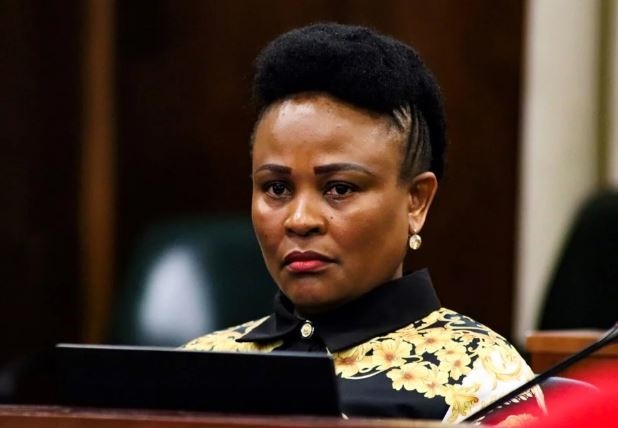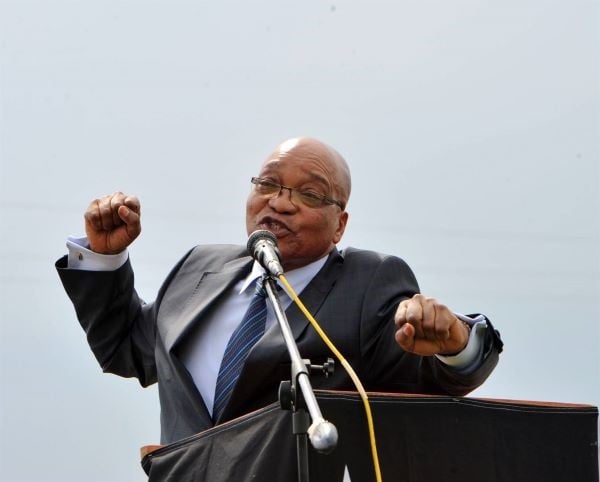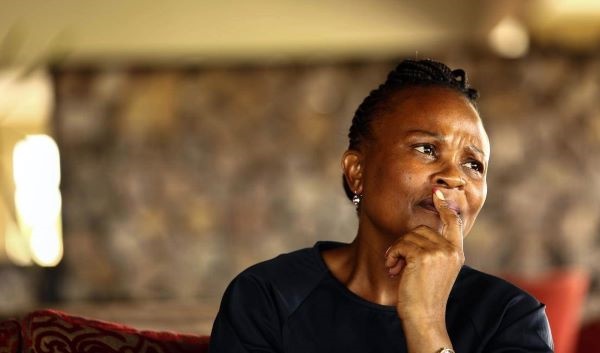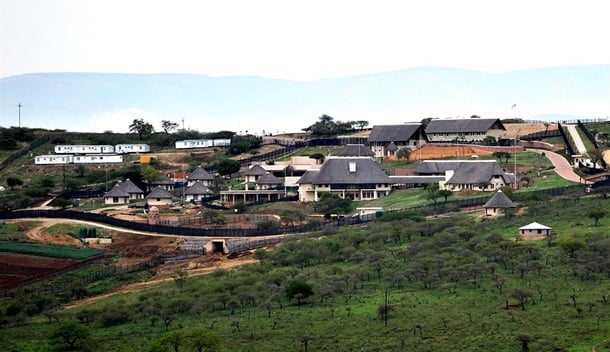Public Protector Busisiwe Mkhwebane has been handed a series of damning court judgments, she has been accused of sloppy investigative reports and suspected of maintaining dubious political alliances. She has become an active political player. So, the question is: Why is she here, and what does she want? Sarah Evans and Kyle Cowan reports.
When former president Jacob Zuma was told Busisiwe Mkhwebane would be the next Public Protector, during a meeting of the ANC's top six in August 2016, he stood, clapped his hands gleefully and declared the process complete.
Weeks earlier, during parliamentary interviews for the position, she had hardly moved MPs to applaud. And, apart from an accusation by DA MP Glynnis Breytenbach that Mkhwebane was a spy, her performance hardly caused a ripple.
Compared to her predecessor, advocate Thuli Madonsela, Mkhwebane seemed innocuous and uninspiring. She had worked at home affairs, worked in the Office the Public Protector previously, and completed a brief stint as an analyst at the State Security Agency (SSA).
The latter posting would prove more controversial as the years passed, but in the beginning, any inference that the SSA would insert itself into the Office of the Public Protector, for the most part, a little too conspiratorial.
Mkhwebane took over from Madonsela in October 2016 with nothing more than rumours about the reasons for her appointment being whispered in corridors.
The Office of the Public Protector's staff were exhausted, having spent sleepless nights readying Madonsela's final investigation, the infamous State of Capture report, for release mere hours before her departure.
They were prepared to welcome Mkhwebane with an open mind, insiders say.
Immediately upon assuming office, she took charge of the SA Reserve Bank/Absa investigation, which had almost been completed by her predecessor.
The new Public Protector appointed a single investigator to the case and embarked on a process that would eventually culminate in her first major court censure.
(That report recommended that Absa should pay back more than R1 billion to the state resulting from an apartheid-era loan to it, and the reserve bank's mandate should be broadened while undercutting its ability to practice inflation targeting.)
In December 2016, Mkhwebane paid Zuma a courtesy call at his official Pretoria residence.
Mostly, the details of that meeting are as murky as the other meetings with the Presidency, and with the SSA, that would occur during Mkhwebane's Absa "lifeboat" investigation.
Most of these details, except for one, came out.
During a meeting between Mkhwebane and the SSA in June 2017, an SSA employee named Mai Moodley handed the Public Protector a typed note: A recommendation that the Reserve Bank's mandate should be changed.
The following month, Mkhwebane would release her reserve bank/Absa report containing that exact recommendation, down to the very wording suggested by Moodley.
The Constitutional Court would rip a hole in Mkhwebane's reputation by overturning that report with a personal costs order against her.
And so, began two-and-a-half years' worth of damning court judgments, sloppy investigative reports, dubious political alliances and fiery denials. It is early 2020, and the country still asks the same question that lingered during those crucial months in late 2016: Who, and what, is the Public Protector?
****
"Inability to process facts…"
The judgments kept on coming. Every politically sensitive report touched by Mkhwebane was overturned on review.
On Tuesday, another judgment landed, overturning her report into President Cyril Ramaphosa's 2017 campaign donations.
A full Bench of the North Gauteng High Court in Pretoria said her handling of the president's arguments in her report "displays a deep-seated inability or refusal to process facts before her in a logical and fair-minded manner".
That report had the potential to bring Ramaphosa to his knees: she had effectively accused him of money laundering and of improperly benefiting from campaign donations.
Yet Mkhwebane's supporters point to her office's track record in handling complaints by the man-on-the-street, or "Gogo Dlamini" as the office likes to say.
People who have felt the sting of an unaccountable state still flock to the Public Protector's local and provincial offices for relief, Mkhwebane's supporters say.
But Stefanie Fick, the executive director of accountability at the Organisation for Undoing Tax Abuse, says Mkhwebane's rebuttal does not hold water if one considers the revelations that have come out her office from former employees.
And the revelations have been as scathing as the court judgments: allegations of interference, incompetence, and malfeasance abound.
The head of the Public Protector's office in the Free State, Sphelo Samuel, in an affidavit to Parliament in February, accused Mkhwebane of unleashing "tyranny" on the office to destroy it - an allegation she denies.
Mkhwebane's office accused Samuels of having an agenda.
She was also accused by other former employees of sticking to the "radical economic transformation" script when criticised for her decisions.
Capturing the Reserve Bank
But the most damning allegation of all came from former investigator Tebogo Kekana who made an affidavit to Parliament in late 2019.
Kekana was the sole investigator on the Reserve Bank/Absa case after Mkhwebane took office.
He had first-hand insight into how that crucial investigation was botched.
And Kekana was a witness to the handing over of the SSA note that the Reserve Bank's mandate should be changed to Mkhwebane.
Reading Kekana's affidavit, it is difficult not to conclude that the Reserve Bank/Absa report had been influenced by a variety of actors who all, in one way or another, wanted to tamper with the reserve bank's independence.
But why? And was Mkhwebane a willing participant in their efforts or did she allow herself to be used by them?
A senior and highly reliable Reserve Bank source hypothesised it has two functions that would be of interest to would-be state capturers.
First, it regulates banks.
A person whose bank accounts had been closed would, hypothetically, want to open their own bank which they would need the reserve bank's permission to do.
Second, the Reserve Bank oversees exchange controls, and anyone needing to move large amounts of cash - the proceeds of state capture, for example - would need the go-ahead from it.
In the end, the Constitutional Court's setting aside of the Public Protector's report into the Reserve Bank/Absa saga ended any hope of amending its mandate.
But the question remains: If Mkhwebane tried, through her report, to fiddle with the Reserve Bank's independence, on whose behalf was she acting?
The former president? The SSA?
It is not clear.
But many hours of interviews conducted with former Public Protector employees and investigators point to a widely held view, that Mkhwebane did not act alone.
And this is the nexus question to be asked about her: Is Mkhwebane incompetent, or is she an actor in a more nefarious ecosystem of players, linked to the former president, who want to control the state?
****
SSA link
The chairperson of the ad hoc parliamentary committee who appointed Mkhwebane as the Public Protector, Dr Makhosi Khoza, told News24 she believed the country was duped into accepting Mkhwebane's candidacy.
At the time of her appointment, the DA raised concerns over her links to the SSA, as she had taken up a position at the agency just days after her name was submitted to the committee by a staff member of Zuma's office, Shirley Maboane.
Links between Mkhwebane and former spy boss Arthur Fraser are circumstantial but add to the suspicions over the Public Protector's links to the intelligence community.
He first met Mkhwebane in 2005 when she was hired as the director of refugee affairs in the National Immigration Service (NIS). At the time Fraser was the deputy director-general of the NIS.
In 2016, the pair took up crucial positions within two weeks of each another - Fraser as director-general of the SSA, and Mkhwebane as Public Protector.
Both have been accused of being political actors.
Former spy boss Arthur Fraser. (Jaco Marais, Netwerk24)
After 11 years at Home Affairs, including four years in a foreign posting in China, Mkhwebane would spend just 107 days working as an analyst at the SSA, roughly 30 days of which were weekends before taking up her post as Public Protector on 15 October 2016.
But the SSA link was dismissed by at least one former employee who worked with Mkhwebane over several years. He told News24 he never had reason to suspect she was part of a broader conspiracy.
Rather, the problem was mainly that she simply was not a good lawyer, he said.
This was accompanied by a great deal of paranoia which gave rise to the securitisation of the office, and possibly a stronger reliance on the SSA, he postulated.
This, in turn, had seen Mkhwebane seemingly ally herself with a "radical economic transformation" crowd on social media.
It was more a convergence of interests than a plot to recapture the state, the former employee said.
Nkandla?
Mkhwebane's nomination to the post by a little-known MP from Nkandla poses a similar dilemma: is it a coincidence that her nominator came from Zuma's home village?
Zuma's apparent thrill at the news that Mkhwebane was appointed always seemed strange to her, Khoza told News24.
Meanwhile, Zuma's reaction to Mkhwebane's appointment pushed Khoza to delve into the committee's records to uncover more details surrounding her nomination.
She then uncovered that Professor Themba Msimang - a noted poet, academic and IFP MP from Nkandla - had named Mkhwebane as a candidate for shortlisting.
"Almost every other political party had forwarded the name of a person they wanted to be shortlisted. But the IFP had not at that stage indicated who they wanted. So, when they [IFP] raised it there, we didn't see anything suspicious," Khoza told News24.
"In fact, I even remember saying to Prof, I hope you are not being handled, and he said no, no ways. He said he would feel so bad if something would go wrong."
In September 2019, during a sitting of an ad hoc rules committee set up to decide on Parliament's rules on the removal of the head of a Chapter 9 institution, such as the Public Protector, Msimang in an about-turn, sought to distance the IFP from Mkhwebane's nomination.
"I nominated her as a member of the ad hoc committee [that appointed the Public Protector]. She was not a candidate of the IFP," Msimang said.
"I did not know her. I based my nomination on her CV."
Msimang did not respond to requests from News24 for comment.
****
A tyranny of incompetence
These events aside, more tangible criticism of Mkhwebane is what her impact has been on the operations of the Office of the Public Protector.
Samuel and others have accused Mkhwebane of dismantling an internal peer review mechanism at the office that ultimately gave her the power to interfere with reports from provincial offices.
One such instance, according to Samuel, is the Estina dairy farm investigation, which he alleged was sanitised by Mkhwebane to exclude damning findings made against Ace Magashule and Mosebenzi Zwani in a draft report.
Mkhwebane, unsurprisingly, denied this too.
Much like the appointment of judges, the heads of Chapter 9 institutions are difficult to remove, and for good reason: they need to operate independently, which means they should not live in constant fear of being arbitrarily removed from office because of political grievances.
Yet, this works the other way, too: if the incumbent is problematic, removal becomes a highly political issue.
The balance of power in the ANC's caucus will be the true litmus test of whether Mkhwebane survives, politically.
However, she is not without support in the party's caucus.
And she also has the support of the EFF.
IOL reported at least 10 ANC MPs visited Mkhwebane at her Pretoria home after the State of the Nation Address last month.
ANC MP Supra Mahumapelo has reportedly said the party would not support the motion to remove her.
Mkhwebane's 50th birthday party in January was attended by the who's who of the Zuma/radical economic transformation faction - Zwane, Bongani Bongo, Ekurhuleni mayor Mzwandile Masina and Mzwanele Manyi were among the guests.
It is tempting to connect the dots between this guest-list, the radical economic transformation faction, its leader, Zuma, and its broadly ideological stance that oozed throughout the "Lifeboat" report.
But crucial pieces of the puzzle are still missing.
What does the Public Protector really want?
Is she as incompetent as the courts say, or is she a chess piece in a bigger game?
It is hard to say.
But in connecting the dots, there is one image that runs right through it all: Zuma, in August 2016, clapping with glee, declaring the process complete...






